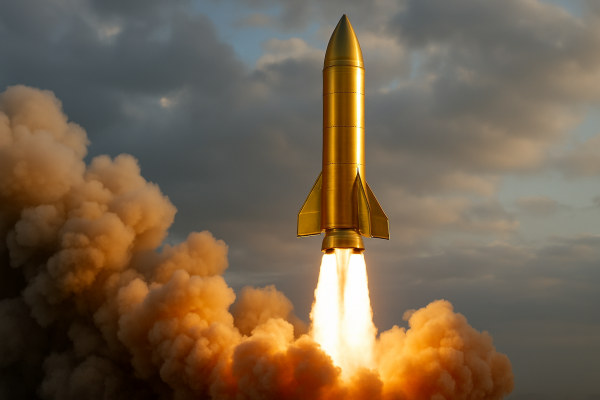April 23rd, 2024 | 07:15 CEST
RWE, Kraken Energy, Nel ASA - Germany's industry under pressure
Germany is pursuing its own path in energy policy and will rely entirely on renewable energies in future. Robert Habeck emphasized that Germany is now independent of Russian gas. However, there is no talk of independence, as Germany has become a net importer of electricity, indirectly importing gas from Russia and even nuclear power. This is because the energy storage facilities in Germany for renewable energies are not even sufficient for one hour. In addition, Germany has some of the highest electricity prices, which is already prompting industry to relocate some of its production abroad. Nuclear power is an emission-free alternative, and many power plants are being built worldwide. Uranium could become scarce here. Whether hydrogen can solve the energy storage problem is currently questionable.
time to read: 5 minutes
|
Author:
Armin Schulz
ISIN:
RWE AG INH O.N. | DE0007037129 , KRAKEN ENERGY CORP | CA50075X1024 , NEL ASA NK-_20 | NO0010081235
Table of contents:
Author
Armin Schulz
Born in Mönchengladbach, he studied business administration in the Netherlands. In the course of his studies he came into contact with the stock exchange for the first time. He has more than 25 years of experience in stock market business.
Tag cloud
Shares cloud
RWE - Premature lignite phase-out?
RWE, in particular, is directly affected by German energy policy. The Company had to restructure due to the shutdown of nuclear and coal-fired power plants. Even though the Company has received compensation payments for this, it is going through a transformation. A study by the environmental protection organization BUND considers an acceleration of the lignite phase-out in North Rhine-Westphalia possible as an analysis shows that the demand for lignite was overestimated. The Essen-based company is also involved here, for example, with the Lützenrath site occupied by climate activists.
The restructuring of the utility is progressing, and renewable energies are gaining importance in the Company's portfolio. Wind power plays an important role in this regard. RWE plans to increase its installed capacity of onshore wind turbines to 14 gigawatts by 2030 and will purchase around 120 wind turbines from Nordex over the next few years. The contract with the German turbine manufacturer was made public in March. The Company also plans to build gas-fired power plants with a capacity of 3 gigawatts in Germany. In South Korea, the rights for an offshore wind farm with a planned capacity of 495 megawatts were secured at the beginning of April. This project is scheduled to go into operation in 2031.
The announcement also indicates that the company is actively seeking lucrative projects internationally. They follow strict criteria, minimizing the likelihood of failures. After a long decline, wholesale electricity prices have recently increased.. It is not certain whether this is due to the shutdown of German coal-fired power plants. It is prudent to wait and see how prices evolve in the coming weeks. However, rising prices are good for RWE's business. As a result, the share has also been able to break away from its low for the year and is currently trading at EUR 31.75.
Kraken Energy - Uranium is becoming scarce
As mentioned earlier, Germany is abandoning nuclear power compared to many other industrialized countries. Several power plants are either in planning or under construction, driving demand for uranium. Coupled with a steadily growing production deficit, uranium prices have already risen significantly. The US, in particular, is facing a considerable supply gap. Domestic uranium production could be promoted here. Kraken Energy, a company specializing in uranium exploration and development, would benefit from this. The Company owns four high-grade uranium projects in the US, including three in Nevada and one in Utah.
These projects are noteworthy not only because of their high ore grades but also because of the infrastructure already in place and the support of reliable geological data. Drilling at the Harts Point Uranium Project in Utah began at the end of February. The successful completion of the work was announced on March 26. Two drill holes were drilled 5 km apart. Increased radioactivity was detected in both drill holes. CEO Matthew Schwab was very satisfied. However, the Apex project remains Kraken Energy's flagship and has historically delivered significant quantities of uranium.
It, therefore, has appropriate infrastructure and non-compliant reported reserves that have not yet been exhausted. Kraken Energy aims to develop a realistic and reliable hub-and-spoke model for uranium production in the US. The Company's plans are in line with the increasing dynamics in the uranium market. In times when people want to reduce emissions, there is no way around nuclear power plants. They can reduce CO2 emissions to zero. Nuclear power is part of an effective energy mix for industrialized nations. Despite the good drilling results, the share price has yet to be able to rise and is currently trading at CAD 0.105.
Nel ASA - Figures disappoint investors
As nuclear power in Germany is currently not coming back, the question remains as to how the expanded renewable energies can be stored. On the one hand, expanding the grids is very expensive and will take time. One alternative would be to store the surplus energy from solar and wind power as green hydrogen. This would be both storable and transportable but would require electrolysers. One specialist in this field is the Norwegian company Nel ASA. The share was listed at NOK 35.15 at the beginning of 2021, which was the peak of the hydrogen hype. Since then, the share price has fallen by almost 90%.
This is because, despite all the growth prospects, the Company is still not profitable. On April 17, the Company presented its figures for the first quarter. Nel ASA recorded a sales increase of 14% to NOK 387 million, compared to NOK 341 million in the same quarter of the previous year. The improvement in EBITDA to NOK -16 million, compared to NOK -121 million in the previous year, was partly due to the renegotiation of the Nikola contracts. A decrease in the net loss to NOK -22 million was also recorded, a significant improvement from NOK -192 million in the previous year.
The Company's order volume amounted to NOK 459 million in the reporting period, almost the same as in the previous year. The order backlog decreased slightly to NOK 2.4 billion, and cash reserves amounted to NOK 3.26 billion at the end of the quarter compared to NOK 4.62 billion at the beginning of the year. Overall, investors were disappointed and had expected more. Before the figures, the mood was much more positive, partly due to high subsidy commitments from the US, where a gigafactory is to be built. One share currently costs NOK 4.70 and is approaching its low for the year of NOK 4.23.
Without the appropriate infrastructure, such as suitable energy storage facilities and power lines, relying solely on renewable energy is not advisable. Otherwise, one becomes dependent on other countries. RWE has already transformed its energy portfolio towards renewable energies. The Company is benefiting from rising wholesale electricity prices. Kraken Energy is active in the US and focuses mainly on historic uranium deposits, thus leveraging existing infrastructure. The Company wants to establish a hub-and-spoke system. One alternative for energy storage for renewable energies is hydrogen technology. Here, Nel ASA has positioned itself and supplies suitable electrolysers for the production of green hydrogen. However, the Company is operating at a loss.
Conflict of interest
Pursuant to §85 of the German Securities Trading Act (WpHG), we point out that Apaton Finance GmbH as well as partners, authors or employees of Apaton Finance GmbH (hereinafter referred to as "Relevant Persons") may hold shares or other financial instruments of the aforementioned companies in the future or may bet on rising or falling prices and thus a conflict of interest may arise in the future. The Relevant Persons reserve the right to buy or sell shares or other financial instruments of the Company at any time (hereinafter each a "Transaction"). Transactions may, under certain circumstances, influence the respective price of the shares or other financial instruments of the Company.
In addition, Apaton Finance GmbH is active in the context of the preparation and publication of the reporting in paid contractual relationships.
For this reason, there is a concrete conflict of interest.
The above information on existing conflicts of interest applies to all types and forms of publication used by Apaton Finance GmbH for publications on companies.
Risk notice
Apaton Finance GmbH offers editors, agencies and companies the opportunity to publish commentaries, interviews, summaries, news and the like on news.financial. These contents are exclusively for the information of the readers and do not represent any call to action or recommendations, neither explicitly nor implicitly they are to be understood as an assurance of possible price developments. The contents do not replace individual expert investment advice and do not constitute an offer to sell the discussed share(s) or other financial instruments, nor an invitation to buy or sell such.
The content is expressly not a financial analysis, but a journalistic or advertising text. Readers or users who make investment decisions or carry out transactions on the basis of the information provided here do so entirely at their own risk. No contractual relationship is established between Apaton Finance GmbH and its readers or the users of its offers, as our information only refers to the company and not to the investment decision of the reader or user.
The acquisition of financial instruments involves high risks, which can lead to the total loss of the invested capital. The information published by Apaton Finance GmbH and its authors is based on careful research. Nevertheless, no liability is assumed for financial losses or a content-related guarantee for the topicality, correctness, appropriateness and completeness of the content provided here. Please also note our Terms of use.




